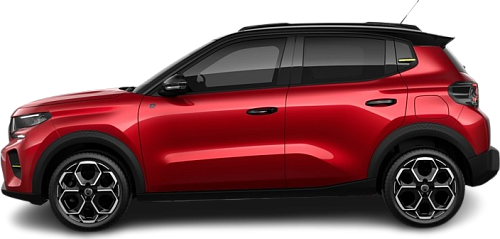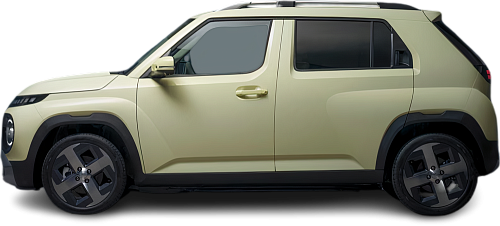USA EV Comparison: Citroën e-C3 Base vs Hyundai Casper (Inster) Electric Standard Range
Struggling to Decide? Let AI Help!
Your AI Summary Is Ready!
General Info
While both vehicles are currently in production, they are not sold in the United States.
The two vehicles share the same body style: SUV.
| Property | Citroën e-C3 Base | Hyundai Casper (Inster) Electric Standard Range |
|---|---|---|
| Years of Production | 2024-… | 2024-… |
| Current Status | Produced | Produced |
| Country of Manufacture | Slovakia | South Korea |
| Body Style | SUV | SUV |
| Market Availability | EU | EU |
| GCC Score | 5 | 5.2 |
Range and Efficiency
While the Citroën e-C3 (2024-…) offers a longer real-world range and a bigger battery, it is less energy-efficient than the Hyundai Casper (Inster) Electric Standard Range (2024-...).
| Property | Citroën e-C3 Base | Hyundai Casper (Inster) Electric Standard Range |
|---|---|---|
| Range (WLTP) | 199 mi | 186 mi |
| Range (GCC) | 169 mi | 158 mi |
| Battery Capacity (Nominal) | 45 kWh | 42 kWh |
| Battery Capacity (Usable) | 44 kWh | 39 kWh |
| Efficiency per 100 mi | 26 kWh/100 mi | 24.7 kWh/100 mi |
| Efficiency per kWh | 3.84 mi/kWh | 4.05 mi/kWh |
| Range and Efficiency Score | 5.8 | 6 |
Charging
Both vehicles utilize a standard 400-volt architecture.
The Hyundai Casper (Inster) Electric Standard Range (2024-...) offers faster charging speeds at DC stations, reaching up to 120 kW, while the Citroën e-C3 (2024-…) maxes out at 100 kW.
The Hyundai Casper (Inster) Electric Standard Range (2024-...) features a more powerful on-board charger, supporting a maximum AC charging power of 11 kW, whereas the Citroën e-C3 (2024-…) is limited to 7.4 kW.
| Property | Citroën e-C3 Base | Hyundai Casper (Inster) Electric Standard Range |
|---|---|---|
| Max Charging Power (AC) | 7.4 kW | 11 kW |
| Max Charging Power (DC) | 100 kW | 120 kW |
| Architecture | 400 V | 400 V |
| Charge Port | CCS Type 2 | CCS Type 1 |
| Charging Score | 4.2 | 5.3 |
Performance
Both vehicles are front-wheel drive.
The Citroën e-C3 (2024-…) boasts greater motor power and accelerates faster from 0 to 60 mph.
| Property | Citroën e-C3 Base | Hyundai Casper (Inster) Electric Standard Range |
|---|---|---|
| Drive Type | FWD | FWD |
| Motor Type | PMSM | PMSM |
| Motor Power (kW) | 83 kW | 71 kW |
| Motor Power (hp) | 111 hp | 95 hp |
| Motor Torque | 89 lb-ft | 108 lb-ft |
| 0-60 mph | 11.1 s | 11.3 s |
| Top Speed | 84 mph | 87 mph |
| Performance Score | 1.9 | 1.9 |
Dimensions
The Citroën e-C3 (2024-…) is longer and wider, but about the same height as the Hyundai Casper (Inster) Electric Standard Range (2024-...).
Both models have similar wheelbase lengths.
| Property | Citroën e-C3 Base | Hyundai Casper (Inster) Electric Standard Range |
|---|---|---|
| Length | 158.1 in | 150.6 in |
| Width (with Mirrors) | 71.4 in | - Width (with Mirrors) |
| Width (w/o Mirrors) | 69.1 in | 63.4 in |
| Height | 62.1 in | 62 in |
| Wheelbase | 100 in | 101.6 in |
Cargo and Towing
The Citroën e-C3 (2024-…) provides more cargo capacity, featuring both a larger trunk and more space with the rear seats folded.
Neither car is equipped with a frunk (front trunk).
The Citroën e-C3 (2024-…) has a towing capacity of up to 1212 lb, whereas the Hyundai Casper (Inster) Electric Standard Range (2024-...) is not officially rated for towing in the US.
| Property | Citroën e-C3 Base | Hyundai Casper (Inster) Electric Standard Range |
|---|---|---|
| Number of Seats | 5 | 5 |
| Curb Weight | 3287 lb | 3086 lb |
| Cargo Volume (Trunk) | 10.9 ft3 | 9.9 ft3 |
| Cargo Volume (Max) | 42.4 ft3 | 12.4 ft3 |
| Towing Capacity | 1212 lb | - Towing Capacity |
| Cargo and Towing Score | 5.6 | 5.1 |




